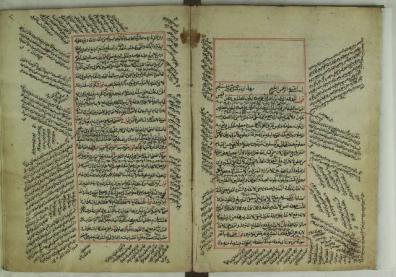Interpreting the Koran: reading practices and discursive strategies

Seminar description
The Qur'an plays an eminent role in Islam, both in social and intellectual life. Over the centuries, it has been the subject of constant debate within the Muslim world, a debate that continues to this day, sometimes virulently, in Western academia as well as among Muslim scholars and intellectuals. In these studies and debates, the historical question of the Qur'anic corpus, its composition and sources, occupies a predominant place. This is not the approach we are focusing on this year.
The 2024 seminar, which consists of 2 study days - the first on March 6, the second on May 15 - will examine various aspects of Qur'anic interpretation. All scholars of Islam have at one time or another been confronted with the Koranic text and the problems posed by its interpretation. In such cases, many of them are most often, if not systematically, led to turn to exegesis of the Koran, which thus constitutes a primary source for them. In this way, there is a tendency to rely on Quranic exegesis to better understand the history and diversification of currents of thought, even if they are not linked to politico-religious formations. It is mainly specialists in kalām and uṣūl al-dīn, fiqh and Sufism who make abundant use of the immense exegetical corpus at their disposal, not forgetting, however, specialists in the various sciences of the Arabic language.
The ambition of these study days is to enable each specialist in a field, starting from his or her personal practice and therefore experience, to look less at Qur'anic exegesis as a documentary source or as a specific literary genre than as practice to be scrutinized and questioned. We must obviously take into account both the historical and spatial dimensions in the questioning that will be proposed. For example, how can we account for the weight of Khorasan in the first great exegetical texts, or the particularities of Andalusian exegetes? We could also look at the impact of the exegete's doctrinal positioning, in terms of law, theology or spirituality, on the specificities of the exegesis produced, or at the consequences of the Westernization of the Islamic world on exegetical production. Cases can be presented that relate either to a pericope, a verse or even a word. Focus on a single exegete or several, or on "disciplinary" exegesis (fiqh, taṣawwuf, kalām, etc.) or as a literary genre or branch of Muslim knowledge.
Each of the two days will be devoted to a particular approach: we have entitled the first "reading practices", as it will involve each speaker delivering his or her personal practice of frequenting exegetical works.
The second day is entitled "Discursive strategies". The tafāsīr are places of confrontation or encounter. Debates contemporary with the author or older survive there, and spaces of freedom flourish, enabling the expression of ideas singular to the place or time.
Program
Thematic readings - Author readings
Moderator: Christian Muller (CNRS - IRHT)
- 10am-10.30am: Mohamed Hayyan (PhD student, Ephe): Mobilizing and interpreting the Qur'an in the kalām: the case of the fāsiq
- 10:30am-11am: Tohir Mustofa, (PhD student Ephe): Rāzī's Tafsīr
Discussion and break: 30 min
Mystical discourses
Moderator: Grégory Vandamme (UCLouvain, via zoom)
- 11:30am-12pm : Amélie Neuve Église (Inalco): La notion d'intercession et ses enjeux dans le Tafsīr al-mīzān de Muḥammad Ḥusayn Ṭabāṭabāʾī (1903-1981)"
- 12pm-12:30pm: Salah Bahmani (PhD student, EPHE): Le tafsīr ibadite contemporain (Bayyud, Tfayesh)
Discussion 15 min and lunch break
Contemporary reading practices
Moderator: Francesco Chiabotti (Inalco, CERMOM)
- 2:30pm-3pm: Nadir Boudjellal (PhD student, Cermom): The cosmological interpretation of the isolated letters of the Qur'an (via zoom)
- 3pm-3:30pm: Faezeh Bekhnaveh (PhD student, Cermom): "This Qur'an" (īn Qor'ān) and "the other Qur'an" (Qorʾān-e degar): the method of interpreting the Qur'an through self-knowledge (ta'wīl-e khīsh) according to Mowlānā Rūmī (via zoom)
Discussion 15 min
Final discussion
End of the day 4:30pm
Organizers
- Jean-Jacques Thibon, Inalco, CERMOM
- Francesco Chiabotti, Inalco, CERMOM
- Hocine Benkheira, Ephe